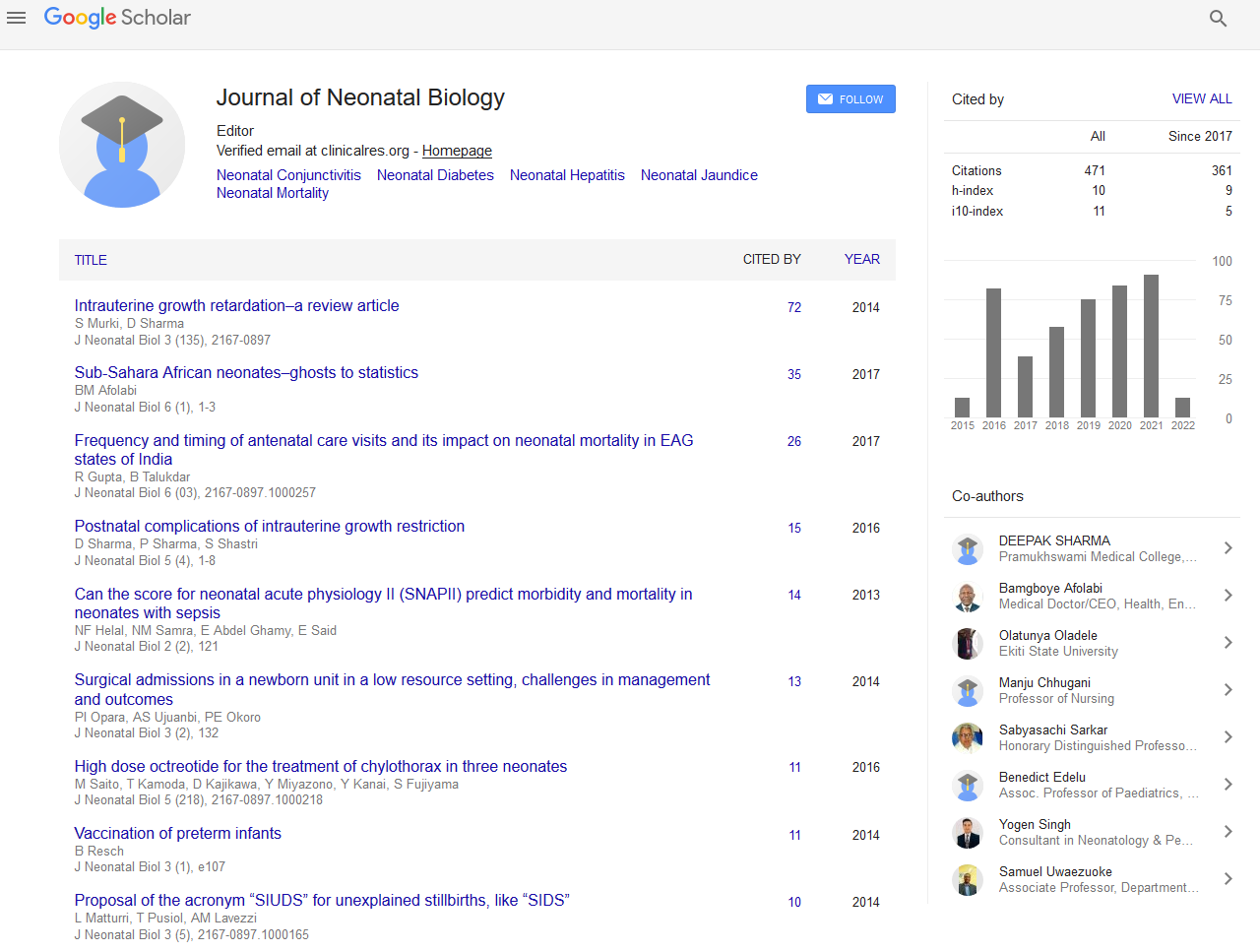PMC/PubMed Indexed Articles
Indexed In
- Genamics JournalSeek
- RefSeek
- Hamdard University
- EBSCO A-Z
- OCLC- WorldCat
- Publons
- Geneva Foundation for Medical Education and Research
- Euro Pub
- Google Scholar
Useful Links
Share This Page
Journal Flyer

Open Access Journals
- Agri and Aquaculture
- Biochemistry
- Bioinformatics & Systems Biology
- Business & Management
- Chemistry
- Clinical Sciences
- Engineering
- Food & Nutrition
- General Science
- Genetics & Molecular Biology
- Immunology & Microbiology
- Medical Sciences
- Neuroscience & Psychology
- Nursing & Health Care
- Pharmaceutical Sciences
Fetal and neonatal alloimmnune thrombocytopenia (FNATP): Frequency, pathophysiology and algorithm of laboratory investigation and treatment
20th International Conference on Neonatology and Perinatology
December 04-06, 2017 | Madrid, Spain
Maja Tomicic
Croatian Institute of Transfusion Medicine, Croatia
Scientific Tracks Abstracts: J Neonatal Biol
Abstract:
Background: Alloimmune fetal and neonatal thrombocytopenia (FNATP) is the result of maternal alloimmunization during pregnancy to fetal platelet antigens (HPA) inherited from the father. In most cases develops consequently to alloimmunization to the specific platelet antigens (HPA)-1a and-5b, less frequently HPA-3a and -15a/b. FNATP has an incidence of 1:1000 to 1:2000 births in white populations. It is self-limiting and transient disorder with an excellent prognosis in absence of intracerebral bleeding (ICH). Current guidelines recommended transfusion of HPA compatibile platelets to prevent ICH. Aim: The aim of this study was to establish an algorithm of laboratory testing for FNATP and to analyze laboratory and clinical data on platelet transfusions in anti-HPA-1a cases. Methods: An algorithm of laboratory testing for FNATP included serologic screening of maternal and neonatal sera/plasma and platelets by immunofluorescence (IF) method; direct and indirect test. The monoclonal antibody immobilization of platelet antigens (MAIPA) and PAK 12-KIT (Lifecodes/Immucor, USA) were employed to determine anti-HPA antibody specificity. Results of serologic anti-HPA testing were confirmed by maternal and neonatal/paternal HPA-1, -2, -3, -5 and -15 genotyping by PCR-SSP method. Results: Serology screening for FNATP yielded positive results in 56 of investigated cases. Anti-HPA antibodies were detected in 34 of 56 (61%) cases of serologically positive NATP, i.e. 19 anti-HPA-1a, 11 anti-HPA-5b, 1 antiHPA-1b, 1 antiHPA-3a, 1 antiHPA-5a and 1 anti-HPA-15a. In 6 of 56 (11%) pan-reactive (anti GP IIb-IIIa) autoantibodies in mothers with ITP were detected. In another 16 of 56 (28%) cases, anti-HPA specificity could not be demonstrated. The average lowest platelet count in newborn blood was 60 x 109/L (min. 11 and max. 104) and duration of thrombocytopenia 1.5 weeks (min. 0.5 and max. 3). 14 of 16 (87%) neonates did not receive any treatment and there were no signs of hemorrhage. One newborn received platelet transfusions, intravenous gamma globulins and corticoids, and another three transfusions and intravenous gamma globulins. All of them reached full recovery. There was no fatal disease. Conclusion: FNATP is rare but potentially life-threatening disorder. Serologic testing for FNATP in case of isolated thrombocytopenia in the newborn contributed considerably to timely detection of this disease. Platelet transfusions are needed in severe cases of FNATP to prevent ICH. In the absence of HPA compatibile platelets random donor transfusion is an acceptable approach in urgent situations. Recent Publications: 1. Peterson JA, Mc Farland JG, Curtis BR and Aster RH (2013) Neonatal alloimmune thrombocytopenia: pathogenesis, diagnosis and management. Br. J Hametol. 16 (1): 3-14. 2. Kaplan C, Daffos F, Forestier F, Cox WL, at al (1988) Management of alloimmune thrombocytopenia: antenatal diagnosis and in ztero transfusion of maternal platelets. Blood. 72 (1): 340-343. 3. Kiefel V, Bassler D, Paes B, et al (2006) Antigen-positive Platelet transfusion in neonatal alloimmune thrombocytopenia (NAIT). Blood. 107 (9): 3761-3763. 4. Yougbare I, Lang S, Yang H, et al (2015) Maternal anti-platelet beta 3 integrins imapair angiogenesis and cause intracranial hemorrhage. The Journal of Clinical Investigation. 125 (4): 1545-1556.
Biography :
Maja Tomicic is currently working at Croatian Institute of Transfusion Medicine (CITM) as Head of Department for Platelet and Leukocyte Diagnostics and Haemostaseology, and Education Department and Specialist of Transfusion Medicine, from 1992 and as Scientific Assistant, University of Zagreb Medical School from 2012. CITM is National Blood Transfusion Center that collects and test donor’s blood, produces blood products and performs pretransfusion testing patients and pregnant women. As a Head of Department, she has responsibilities for development and introduction of methods for platelet and leukocyte immunogenetic and hemostasis testing for outpatients, blood products quality control hemostasis testing, and investigation of transfusion associated acute lung injury (TRALI), post transfusion purpura (PTP), fetal and neonatal alloimmune thrombocytopenia (FNATP) and neutropenia (ANN). She has published 28 papers; 19/28 cities in CC, 11/28 classified as scientific paper, MS thesis; “Frequency and significance of anti-platelet antibodies in pregnant women and hematology patients”, PhD thesis “Serological, molecular and clinic characteristics of alloimmune neonatal neutropenia”, 62 congress abstracts, 24/59 in CC journals, 37/59 in “Index Medicus” journals.


